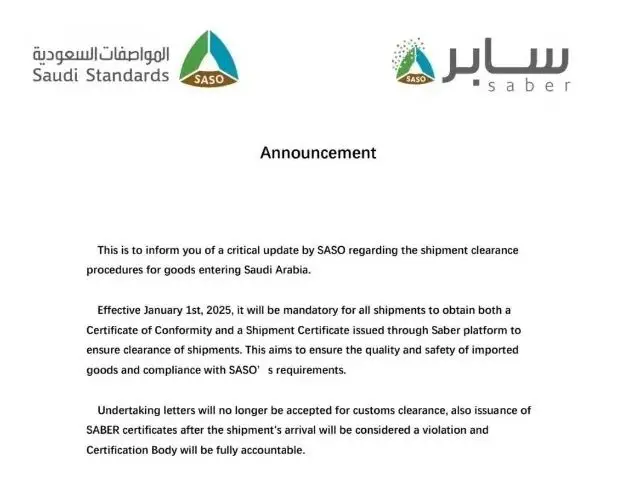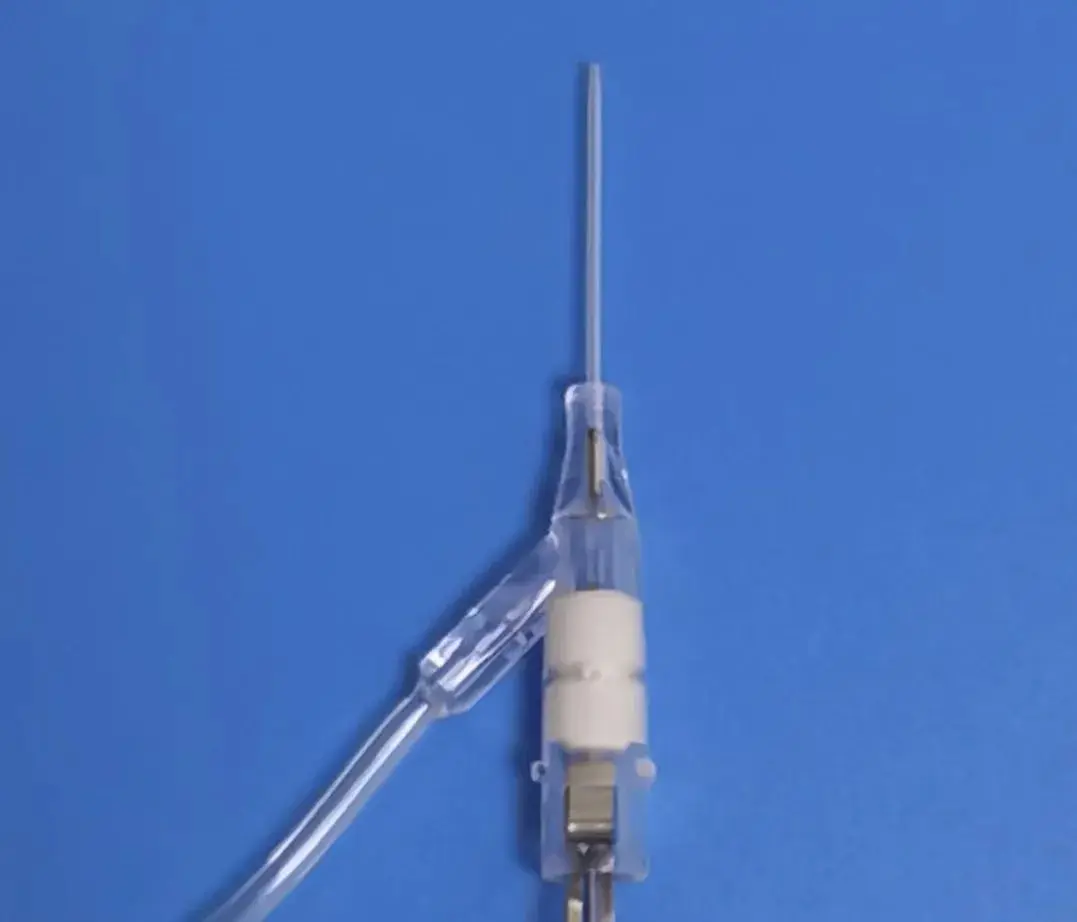
What is the SASO Certificate in Saudi Arabia?
According to the latest notice from the Saudi Standards Organization (SASO), starting from January 1, 2025, all goods exported to Saudi Arabia must be submitted through the SABER system and obtain the following certificates: PCoC (Product Conformity Certificate) and SCoC (Shipment Certificate of Conformity).
After this change, the previously used Undertaking Letters will no longer be valid for customs clearance. Any SC certificates applied for after the goods arrive will be considered invalid, resulting in unsuccessful clearance. Consequently, any penalties, detention charges, or demurrage fees incurred may be fully borne by the importer.
Overview of SABER Certification
SABER Certification is a mandatory product certification system in Saudi Arabia designed to ensure that imported products comply with Saudi standards and regulations concerning quality, safety, and environmental protection. All products sold in Saudi Arabia, including machinery and equipment, must undergo SABER certification.

Types of SABER Certification
SABER certification is a two-stage process that requires obtaining two certificates:
PC Certificate (Product Conformity Certificate):
- This is the product registration certificate that proves the product complies with Saudi technical regulations and standards.
- Validity: Usually valid for one year; after expiration, reapplication is necessary. For multiple shipments of the same product within the validity period, there is no need to reapply for the PC certificate.
- Application Process: Relatively complex, requiring the submission of product manuals, technical specifications, test reports, and proof of the manufacturer's qualifications, among other necessary documents. The certification body will then review the submission.
- Importance: The PC certificate is a crucial requirement for a product to be sold in the Saudi market and has a decisive impact on market entry.
SC Certificate (Shipment Conformity Certificate):
- This is a shipping certificate that proves that the batch of goods being imported matches the product described in the PC certificate and complies with Saudi requirements.
- Validity: Valid only for the specific batch of goods; each shipment requires a new SC certificate.
- Application Process: Relatively simple, but the importer must submit product photos, trademarks, HS codes, and other necessary documents, as well as confirm the validity of the PC certificate.
- Importance: The SC certificate is essential for customs clearance and plays a crucial role in ensuring the smooth entry of goods into the Saudi market.

Fields and Industries Covered by SASO Certification
SASO certification covers a wide range of industries, including but not limited to:
- Electrical Products: Such as household appliances and electronic devices.
- Mechanical Equipment: Including industrial machinery and construction equipment.
- Building Materials: Such as cement, steel, and pipes.
- Food Products: Including various foods and their packaging materials.
- Chemicals: Such as raw chemicals and cleaning agents.
- Automobiles and Parts: Such as vehicles, tires, and accessories.
According to SABER, products are classified by risk levels: High, Medium, and Low. Depending on the risk level, different conformity assessment procedures will be applied by accredited organizations.
1. Provide: Product name + (Saudi) Customs code.
2. Query: Check on the Saudi SABER official website. If marked as "regulated," it requires COC certification; if "Non-regulated," only form-based certification is needed.
Process for Applying for SABER-SC Certificate
The process of applying for the SABER-SC certificate generally involves the following steps:
- Importer Submission: The importer submits the SC certificate application via the SABER system before shipment.
- PC Certificate Verification: The SABER system will verify the validity of the corresponding PC certificate for the shipment, ensuring that the product has been PC certified.
- Payment of Certification Fees: The importer needs to pay the certification fee for the SC certificate.
- Issuance of SC Certificate: After passing the review, the SABER system will issue the SC certificate online.
Key Points Regarding the New SABER-SC Certificate Regulations
According to the latest notification from SASO, starting from January 1, 2025, all goods exported to Saudi Arabia must comply with the following new regulations:
- Pre-arrival Application: All products exported to Saudi Arabia must apply for the SC certificate via the SABER system before the goods arrive. SC certificates applied for after the goods arrive will be considered invalid, leading to issues with customs clearance.
- Bill of Lading to Confirm Transit Status: When applying for the SC certificate, documents such as the bill of lading must be provided to confirm the transit status of the goods. This ensures that the SC certificate application aligns with the actual shipment status.
It is recommended that all parties involved in trade apply for the necessary certificates early, before the goods are shipped, and familiarize themselves with Saudi Arabia's certification requirements and processes to ensure smooth customs clearance.
Email:hello@jjrlab.com
Write your message here and send it to us
 Toothbrush FDA Certification Testing
Toothbrush FDA Certification Testing
 Snoring Device FDA 510k Standard Testing
Snoring Device FDA 510k Standard Testing
 Single Use Intravenous Catheter Certification Test
Single Use Intravenous Catheter Certification Test
 Silicone Material Product Compliance Certification
Silicone Material Product Compliance Certification
 What to Do If Cytotoxicity Test Results Are Positi
What to Do If Cytotoxicity Test Results Are Positi
 ISO 10993:5 Cytotoxicity Testing Methods
ISO 10993:5 Cytotoxicity Testing Methods
 FDA ISO 10993-1 Biocompatibility Evaluation Guidel
FDA ISO 10993-1 Biocompatibility Evaluation Guidel
 In Vitro Cytotoxicity Testing for Medical Devices
In Vitro Cytotoxicity Testing for Medical Devices
Leave us a message
24-hour online customer service at any time to respond, so that you worry!




